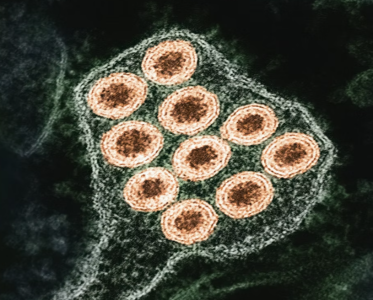This once-wiped-out virus is making a dangerous comeback—and health officials say the risk is real
- Replies 0
It’s not the kind of thing most Americans worry about anymore—but that might be changing.
After years of calm, a virus long thought to be under control is showing signs of dangerous activity. The shift has public health officials sounding the alarm.
And while the numbers may still seem small, the potential consequences are anything but.
For the first time in nearly a decade, rabies has resurfaced in parts of the US, and officials say it’s now a widespread threat.
One area that had successfully eradicated the virus in 2016 has now confirmed 25 animal cases in just the past 12 months.
Public health leaders are calling it an “imminent public health threat” and have begun ramping up disease prevention efforts to try to stop the spread before it reaches people.
The resurgence is hitting a high-density region that includes over 11 million people. Officials believe the outbreak may have migrated from a nearby urban area, where funding for rabies prevention programs has dried up.
Without proper vaccination efforts for stray animals, the virus is gaining a foothold again.
Nassau County Health Commissioner Dr. Irina Gelman described the situation as a “serious and evolving public health concern.” Her department has confirmed that cases are “indicative of wider spread,” not isolated incidents.
While no human infections have been reported yet, the rising rate of cases and their spread among both wild and feral domesticated animals is alarming.

Once symptoms appear, the survival rate drops to nearly zero—making prevention the only true defense.
The World Health Organization estimates that rabies causes 59,000 deaths each year, mostly in Africa and Asia.
In the US, human cases remain rare thanks to vaccination and post-exposure care, but officials stress that the threat is never fully gone.
The virus spreads primarily through the saliva of infected animals. Bites and scratches are the most common routes of transmission, but it can also enter the body through contact with open wounds or through the eyes, nose, or mouth.
Wild animals like raccoons, skunks, and foxes are typical carriers—but the recent outbreak has also affected feral cats. In fact, three infected cats are believed to have traveled from a nearby city, further emphasizing how quickly the virus can move between regions.
Read also: Pet owners beware: Are your dogs secretly spreading deadly infections?
To combat the spread, local health authorities have announced a rabies vaccine bait drop. The plan involves distributing edible vaccine baits in residential neighborhoods and border zones—especially near areas where infected animals have been found.
These bait drops, which can be delivered by hand, vehicle, or aircraft, help immunize wildlife populations that are difficult to capture and treat directly.
Health officials are urging the public to avoid direct contact with wild or stray animals. This includes cats and dogs that appear friendly, especially if they’re acting strangely or showing signs of illness.
Unusual animal behavior—such as aggression, staggering, or excessive drooling—should be reported immediately.
Residents are also advised not to touch dead or dying animals. If removal is necessary, people should use a shovel or protective tools, double-bag the animal, and dispose of it in an outdoor garbage bin.
Read also: A tragic twist: How a life-saving transplant led to a fatal case of rabies
For pet owners, keeping up with rabies vaccinations is essential. All cats, dogs, and ferrets should be vaccinated according to local laws and veterinary recommendations. Puppies and kittens too young for shots should be kept indoors and supervised closely.
The county’s latest response efforts are expected to continue through the fall. Officials anticipate more cases—and possibly more complex challenges as colder months approach.
Dr. Gelman emphasized the seriousness of seeing infected domesticated or feral animals, noting that people may not view a backyard cat as dangerous. That misunderstanding, especially among children, could increase the risk of accidental contact with an infected animal.
She stressed that this is the time to act. “The time for prevention is now,” she said. “One ounce of prevention is worth a pound of cure. That’s exactly what we’re trying to accomplish here.”
Read next: CDC ends bird flu emergency—but experts warn that it isn’t going away

Have you ever encountered a wild animal acting strangely? Do you have tips for keeping pets safe? Do you have stories about how your neighborhood handles wildlife?
After years of calm, a virus long thought to be under control is showing signs of dangerous activity. The shift has public health officials sounding the alarm.
And while the numbers may still seem small, the potential consequences are anything but.
For the first time in nearly a decade, rabies has resurfaced in parts of the US, and officials say it’s now a widespread threat.
One area that had successfully eradicated the virus in 2016 has now confirmed 25 animal cases in just the past 12 months.
Public health leaders are calling it an “imminent public health threat” and have begun ramping up disease prevention efforts to try to stop the spread before it reaches people.
The resurgence is hitting a high-density region that includes over 11 million people. Officials believe the outbreak may have migrated from a nearby urban area, where funding for rabies prevention programs has dried up.
Without proper vaccination efforts for stray animals, the virus is gaining a foothold again.
Nassau County Health Commissioner Dr. Irina Gelman described the situation as a “serious and evolving public health concern.” Her department has confirmed that cases are “indicative of wider spread,” not isolated incidents.
While no human infections have been reported yet, the rising rate of cases and their spread among both wild and feral domesticated animals is alarming.

Rabies is almost always fatal without treatment. Image source: National Institute of Allergy and Infectious Diseases / Unsplash
Once symptoms appear, the survival rate drops to nearly zero—making prevention the only true defense.
The World Health Organization estimates that rabies causes 59,000 deaths each year, mostly in Africa and Asia.
In the US, human cases remain rare thanks to vaccination and post-exposure care, but officials stress that the threat is never fully gone.
The virus spreads primarily through the saliva of infected animals. Bites and scratches are the most common routes of transmission, but it can also enter the body through contact with open wounds or through the eyes, nose, or mouth.
Wild animals like raccoons, skunks, and foxes are typical carriers—but the recent outbreak has also affected feral cats. In fact, three infected cats are believed to have traveled from a nearby city, further emphasizing how quickly the virus can move between regions.
Read also: Pet owners beware: Are your dogs secretly spreading deadly infections?
To combat the spread, local health authorities have announced a rabies vaccine bait drop. The plan involves distributing edible vaccine baits in residential neighborhoods and border zones—especially near areas where infected animals have been found.
These bait drops, which can be delivered by hand, vehicle, or aircraft, help immunize wildlife populations that are difficult to capture and treat directly.
Health officials are urging the public to avoid direct contact with wild or stray animals. This includes cats and dogs that appear friendly, especially if they’re acting strangely or showing signs of illness.
Unusual animal behavior—such as aggression, staggering, or excessive drooling—should be reported immediately.
Residents are also advised not to touch dead or dying animals. If removal is necessary, people should use a shovel or protective tools, double-bag the animal, and dispose of it in an outdoor garbage bin.
Read also: A tragic twist: How a life-saving transplant led to a fatal case of rabies
For pet owners, keeping up with rabies vaccinations is essential. All cats, dogs, and ferrets should be vaccinated according to local laws and veterinary recommendations. Puppies and kittens too young for shots should be kept indoors and supervised closely.
The county’s latest response efforts are expected to continue through the fall. Officials anticipate more cases—and possibly more complex challenges as colder months approach.
Dr. Gelman emphasized the seriousness of seeing infected domesticated or feral animals, noting that people may not view a backyard cat as dangerous. That misunderstanding, especially among children, could increase the risk of accidental contact with an infected animal.
She stressed that this is the time to act. “The time for prevention is now,” she said. “One ounce of prevention is worth a pound of cure. That’s exactly what we’re trying to accomplish here.”
Read next: CDC ends bird flu emergency—but experts warn that it isn’t going away
Key Takeaways
- Rabies has re-emerged in Nassau County, New York, after nearly a decade of being eradicated, leading health officials to declare it an "imminent public health threat" with 25 confirmed animal cases in the past year.
- The virus appears to be spreading from New York City due to reduced funding for animal vaccination programs, and authorities are increasing resources for mitigation and prevention efforts.
- Residents are being urged to avoid contact with wild or stray animals, ensure their pets’ rabies vaccinations are up-to-date, and teach children not to touch wild animals, as rabies can be fatal without prompt treatment.
- To help control the outbreak, the health department plans to distribute rabies vaccine baits across affected areas and is warning the public that rabies is now considered widespread among both wild and feral domesticated animals in the region.






